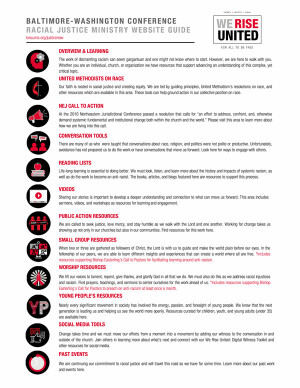Appendix B: Going Deeper
Additional Preparation Resources
Depending upon your experience with the content of this study, you may want to include or replace core preparation items with one or more of the following. These are a mix of resources from different sources that we think will provide interesting perspectives for your discussion and continued exploration of these topics and material. Including these resources here is not a blanket endorsement of the individuals featured. We share these as part of a continued invitation to reflect.
Session 1 Session 2 Session 3 Session 4 Session 5 Session 6
Session 1:
- Ibram X. Kendi’s brief explanation of his antiracism framework (5 min)
- Jane Elliot’s Antiracism activity on Oprah (1992) (32 min)
- Introducing the New Social Principles (6 min)
- Watch Dismantling Racism: A Service of Lament | The United Methodist Church (umc.org) (60 min)
- Read Statement on racism from Ebony bishops
Session 2:
- TED talk: Racism and food insecurity - Malik Yankini (15 min)
- TED talk: Climate justice can't happen without racial justice - David Lammy (9 min)
- Young Methodists Plant Churches with Environmental Gospel
- Explore and learn more about United Methodist Creation Care Teams
- Explore your local Interfaith Power and Light chapter for resources highlighting local issues and lobbying efforts on environmental justice
- Creation Justice Ministries
Session 3:
- Watch Debbie Irving’s excellent video on “Our Whitewashed History” (10 min)
- Listen to the “Seeing White” Podcast and especially episode 2, “How Race Was Made” (28 min)
- Read this article, “The Garbage Man: Why I Collect Racist Objects” by David Pilgrim | [warning: contains graphic descriptions of racist objects]
- Social Principles, the Rights of Racial and Ethnic Persons
- Watch Emerging leaders discuss dismantling racism | The United Methodist Church (umc.org) (53 min)
- Genes Beans. Genetics Studies Prove We’re All More Alike than Different: You can’t argue with biology, but history has other ideas.
Session 4:
- Listen to this three-minute story on NPR, “Racist Housing Practices From The 1930s Linked To Hotter Neighborhoods Today” (3 min)
- Watch this animation documentary by Mark Lopez’s “Segregated By Design” as it reveals the unspoken history of how federal, state, and local governments unconstitutionally segregated major metropolitan areas in the US through law and policy. The documentary is based on the tremendous book, “The Color of Law: A Forgotten History of How Our Government Segregated America” by Richard Rothstein. (17 min)
- “A History of Microfinance” with Muhammad Yunus illustrates microlending and micro-credit has made a world of difference in the lives of families living in poverty. (23 min)
Session 5:
- Watch “Everyone Counts: Accessing Health Care and Addressing Health Disparities in a COVID-19 Era” hosted by the Baltimore-Washington Conference and featuring Dr. Lisa Cooper and Dr. Chidinma Ibe who discuss the health disparities and marginalized communities. (60 min)
- Bryan Stevenson, who founded the Equal Justice Initiative shares some hard truths about America's justice system, starting with a massive imbalance along racial lines: a third of the country’s African-American male population has been incarcerated at some point in their lives. These issues are wrapped up in U.S unexamined history. "We need to talk about an injustice." (23 min)
- From Slavery to Mass Incarceration. Ava DuVernay’s new documentary chronicles how our justice system has been driven by racism from the days of slavery to today’s era of mass incarceration. The United States accounts for 5 percent of the world’s population, but 25 percent of its prisoners. In 2014, more than 2 million people were incarcerated in the United States—of those, 40 percent were African-American men. According to the Sentencing Project, African-American males born today have a one-in-three chance of going to prison in their lifetimes if incarceration trends continue. (13 min)
- Living Our Principles Episode 5: Politics, Power & the World Chapter 1: U.S. Senator Richard Lugar (00-9:35). This video features Senator Richard Lugar who is a United Methodist layperson. Sen. Lugar reminds us that people of faith cannot ignore the political arena. In this episode, we hear from persons who chose to take public office because of their faith. We are reminded that people of faith are joining advocacy groups to construct a unified voice for social change. (9 min)
- What is Restorative Justice and Restorative Justice Practices? Key principles of restorative justice include: A repair of the damage or a righting of the wrong to those harmed; A path of real accountability – making things right in so far as possible – with those harmed and the disrupted community.
- United Methodist Women - Racial Justice, Mass Incarceration and the Criminalization of Communities of Color: A United Methodist Women Priority UMW School to Prison Pipeline Bible Study.
- UM Resolution 5038. Caring for Victims of Crime.
- Resilient and Resistant Conversations sponsored by Strengthening the Black Church for the 21st Century (SBC21)
- “What Would You Do?” How will bystanders in Portland react when they witness someone sawing the lock off a bike? Will the reactions change if the would-be thief is a different race or gender? What Would You Do? Scenario broadcast in July 2016. (8 min)
Session 6:
- Review this video (or transcript) to learn about the United Methodist Church’s “Act of Repentance” initiative, which engaged indigenous peoples from the Philippines, Norway, and the US. (4min)
- Read about the detention by ICE officers of Binsar Siahaan on United Methodist Church property, and on the successful public outcry that led to his return home.
- Read about a 2019 United Methodist action in solidarity with migrants and asylum seekers at the southern border with Mexico.
- Watch Intersectionality: Dismantling Racism Panel Discussion | The United Methodist Church (umc.org). (52 min)
Additional Antiracism Resources:
Click below to see a guide to the BWC's Racial Justice Resources
Visit the BWC's Racial Justice page for hundreds of additional antiracism resources.

